How to install the app on iOS
Follow along with the video below to see how to install our site as a web app on your home screen.
Note: This feature may not be available in some browsers.
You are using an out of date browser. It may not display this or other websites correctly.
You should upgrade or use an alternative browser.
You should upgrade or use an alternative browser.
Urdu & Hindi Poetry
- Thread starter ajtr
- Start date
The Choice
FULL MEMBER
New Recruit
- Joined
- Mar 24, 2017
- Messages
- 3
- Reaction score
- 0
- Country
- Location

Love for the Murderer, yet sympathy for the Victim, but which would you like to requite your affection?
You bow down to your Creator, yet seek the companionship of Iblees, but Whose Mercy will you seek on the Day of Judgement?
*An inspired translation of an Urdu poem by Allama Muhammad Iqbal (RA).*
NakedLunch
BANNED

- Joined
- Dec 31, 2016
- Messages
- 2,300
- Reaction score
- 0
- Country
- Location
Jab na tha kuch to khuda tha,
Agar kuch na hota to khuda hota,
Daboya hai mujhay honay nay,
Agar main na hota to kya hota.
Ghalib explored existentialism before European philosophers..........
Agar kuch na hota to khuda hota,
Daboya hai mujhay honay nay,
Agar main na hota to kya hota.
Ghalib explored existentialism before European philosophers..........
ghazi52
PDF THINK TANK: ANALYST

- Joined
- Mar 21, 2007
- Messages
- 103,045
- Reaction score
- 106
- Country
- Location
Adab Arz hai’
By Sharib Khan
Poetry has always been an essential part of Urdu literature. The epic chain of Urdu ghazals and nazm has incorporated great poets like Meer Taqi Meer, Mirza Ghalib and Mirza Sauda.
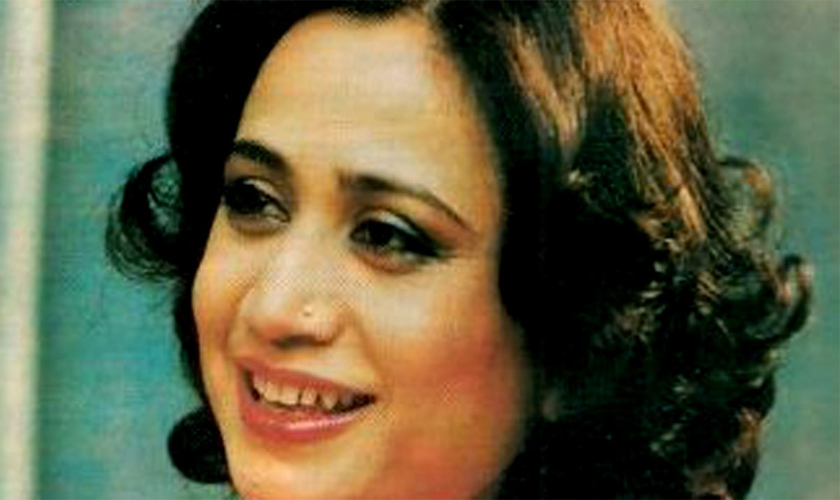
literature
Poetry has always been an essential part of Urdu literature. The epic chain of Urdu ghazals and nazm has incorporated great poets like Meer Taqi Meer, Mirza Ghalib and Mirza Sauda. Whereas, the modern poetry had gems like Faiz Ahmed Faiz, Jaun Elia, Ahmed Faraz, Nasir Kazmi, Josh Malihabadi and Mustafa Zaidi. But this strong tradition of Urdu poetry would have been incomplete without a feminine touch.
This week You! pays tribute to some of the finest Urdu poets of the Sub-Continent:
The first lady of Urdu Poetry
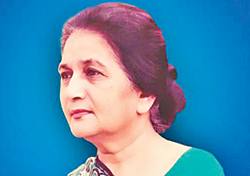
Ada Jafri was born on 24th of August, 1924 in Badayun, U.P, India. Her birth name was Aziz Jahan. She learned poetry from maestros like Akhtar Sheerani and Jafar Ali Khan Asar Lakhnavi. Jafri is regarded as ‘The first lady of Urdu poetry’. She was raised in a society dominated by male poets and intellectuals. The expression of feelings by a woman was considered a taboo then. In the early ‘50s, she was recognized as the first Urdu poetess. Though she wrote in gender-neutral notes, her words have been infatuated with the eternal feminine beauty. To critics, her work was full of polite expression. She amalgamated traditional and progressive thoughts in a beautiful way. Ada Jafri was an expert in both genres of Urdu poetry, nazm and ghazal. One of her most famous ghazals ‘Honton pe kabhi unn ke mera naam bhi aaey’ was sung and popularised by the late Ustad Amanat Ali Khan. Her first book, ‘Main Saz Dhundti Rahi’ was published in 1950 and was a hit. She was honoured with several awards, including the ‘Kamal-e-Fun Award’ and ‘Baba-i-Urdu Molvi Abdul Haq Award’. Ada Jafri passed away after a long illness in March 2015 in Karachi. She was 90.
A poet of romance
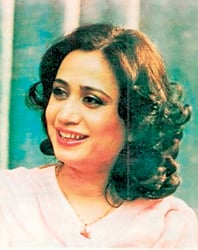
Who doesn’t know about Parveen Shakir? Parveen Shakir is one of the most popular female poets who gave a face to sentiments, exploitations and experiences - specific to women. Parveen Shakir was born on 24th of November, 1952 in Karachi, Pakistan. Known for her often bold approach towards expressing sentiments of a woman, Parveen Shakir started writing at an early age. Her first book ‘Khushbu’, which is also her magnum opus, was published in 1976 and received critical acclaim. Parveen Shakir mainly wrote in two forms, one being the ubiquitous ghazal and the other being free verse. Her poetry is an alluring fusion of classical metaphors and modern sensibility. Many of her couplets and ghazals now hold an iconic state in the world of Urdu literature. Her marriage with Dr. Syed Murad Ali did not work out and ended up giving her the pain of separation, which affected her poetry in many ways. Still remembered as ‘Khushboo ki Shayra’ (Poetess of fragrance), Parveen Shakir had an accident in December 1994. Her death was indeed a great loss to the Urdu poetic world.
A progressive poet
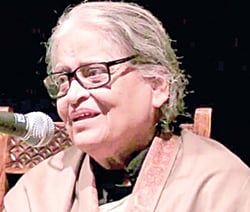
Born in a family of intellectuals, Zehra Nigah is a progressive Urdu poetess and a scriptwriter. Her elder sister Fatima Surayya Bajia was a famous playwright and her brother Anwar Maqsood is a satirist and a playwright as well. She is one the few female poets to get recognition in early ‘50s when the poetic scenario of the country was dominated by male poets. Nigah writes equally mature poetry in the form of ghazal and nazm. Apart from her magical writings, she is popular for her beautiful rhythmic recitation of poetry in several mushairas. Zehra Nigah found herself writing poetry for the first time when she was just 14 years old. Inspired by traditional Urdu poetry, she memorized the works of all classical Urdu and Persian poets by heart. Her home in 1922 is known to be the centre of historical scholarly gatherings of major Urdu poets like Iqbal, Faiz, Majaz, and Firaaq. Her poetical collections ‘Waraq’, ‘Firaq’ and ‘Shaam Ka Pehla Tara’ were critically acclaimed. Awarded with the honours like Pride of Performance, Zehra Nigah has written several super hit television serials as well. She still writes and tends to impress everyone with her beautiful works in mushairas every now and then.
An agent of change
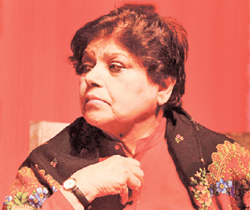
Apart from being a top notch progressive poetess, Kishwar Naheed is a feminist social worker as well. Her work for the development of women in society is notable. She has been a symbol of feminism in Pakistan. Naheed’s poetry speaks liberty in loud notes. Her blunt yet soft style accentuates her dogmatic approach towards women empowerment and participation in Urdu literature made her become a part of many women empowering movements. She was born in Bulandshahr, India in 1940 in a Syed family. She was married to a poet Yousuf Kamran and after his death, she had to work and raise her children alone. She has worked in major NGOs in and outside Pakistan and was the Director General of Pakistan Arts Council as well. She also writes for the Daily Jang newspaper. Her popular work, ‘We Sinful Women’, holds a special place in the sphere of Urdu poetry. Her poetic collections have been translated in English and Spanish as well. She has also been honoured with the top civilian award, Sitara e Imtiaz by the government of Pakistan.
An unconventional poe
t
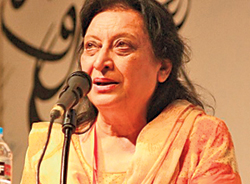
Fahmida Riaz’s life speaks volumes about her struggle towards ultimate perfection. She invented her own unique style in the free verse form of poetry. Born on 28th of July, 1946 in Meerut, Uttar Pradesh, India, Fahmida Riaz got her poem published in ‘Funoon’ for the first time when she was just 15 years old. Ahmed Nadeem Qasmi’s ‘Funoon’ was the best literary magazine at that time with major poets and writers contributing in it. In Zia’s regime her Urdu publication ‘Awaz’ was banned for freedom of speech and she was almost imprisoned. Riaz’s unique approach towards poetry gives her readers a strong fragrance of traditional metaphors embellished with the feminine thought of liberation. She also holds the honour of Sitara e Imtiaz given to her by the president of Pakistan in 2010.
By Sharib Khan
Poetry has always been an essential part of Urdu literature. The epic chain of Urdu ghazals and nazm has incorporated great poets like Meer Taqi Meer, Mirza Ghalib and Mirza Sauda.

literature
Poetry has always been an essential part of Urdu literature. The epic chain of Urdu ghazals and nazm has incorporated great poets like Meer Taqi Meer, Mirza Ghalib and Mirza Sauda. Whereas, the modern poetry had gems like Faiz Ahmed Faiz, Jaun Elia, Ahmed Faraz, Nasir Kazmi, Josh Malihabadi and Mustafa Zaidi. But this strong tradition of Urdu poetry would have been incomplete without a feminine touch.
This week You! pays tribute to some of the finest Urdu poets of the Sub-Continent:
The first lady of Urdu Poetry

Ada Jafri was born on 24th of August, 1924 in Badayun, U.P, India. Her birth name was Aziz Jahan. She learned poetry from maestros like Akhtar Sheerani and Jafar Ali Khan Asar Lakhnavi. Jafri is regarded as ‘The first lady of Urdu poetry’. She was raised in a society dominated by male poets and intellectuals. The expression of feelings by a woman was considered a taboo then. In the early ‘50s, she was recognized as the first Urdu poetess. Though she wrote in gender-neutral notes, her words have been infatuated with the eternal feminine beauty. To critics, her work was full of polite expression. She amalgamated traditional and progressive thoughts in a beautiful way. Ada Jafri was an expert in both genres of Urdu poetry, nazm and ghazal. One of her most famous ghazals ‘Honton pe kabhi unn ke mera naam bhi aaey’ was sung and popularised by the late Ustad Amanat Ali Khan. Her first book, ‘Main Saz Dhundti Rahi’ was published in 1950 and was a hit. She was honoured with several awards, including the ‘Kamal-e-Fun Award’ and ‘Baba-i-Urdu Molvi Abdul Haq Award’. Ada Jafri passed away after a long illness in March 2015 in Karachi. She was 90.
A poet of romance

Who doesn’t know about Parveen Shakir? Parveen Shakir is one of the most popular female poets who gave a face to sentiments, exploitations and experiences - specific to women. Parveen Shakir was born on 24th of November, 1952 in Karachi, Pakistan. Known for her often bold approach towards expressing sentiments of a woman, Parveen Shakir started writing at an early age. Her first book ‘Khushbu’, which is also her magnum opus, was published in 1976 and received critical acclaim. Parveen Shakir mainly wrote in two forms, one being the ubiquitous ghazal and the other being free verse. Her poetry is an alluring fusion of classical metaphors and modern sensibility. Many of her couplets and ghazals now hold an iconic state in the world of Urdu literature. Her marriage with Dr. Syed Murad Ali did not work out and ended up giving her the pain of separation, which affected her poetry in many ways. Still remembered as ‘Khushboo ki Shayra’ (Poetess of fragrance), Parveen Shakir had an accident in December 1994. Her death was indeed a great loss to the Urdu poetic world.
A progressive poet

Born in a family of intellectuals, Zehra Nigah is a progressive Urdu poetess and a scriptwriter. Her elder sister Fatima Surayya Bajia was a famous playwright and her brother Anwar Maqsood is a satirist and a playwright as well. She is one the few female poets to get recognition in early ‘50s when the poetic scenario of the country was dominated by male poets. Nigah writes equally mature poetry in the form of ghazal and nazm. Apart from her magical writings, she is popular for her beautiful rhythmic recitation of poetry in several mushairas. Zehra Nigah found herself writing poetry for the first time when she was just 14 years old. Inspired by traditional Urdu poetry, she memorized the works of all classical Urdu and Persian poets by heart. Her home in 1922 is known to be the centre of historical scholarly gatherings of major Urdu poets like Iqbal, Faiz, Majaz, and Firaaq. Her poetical collections ‘Waraq’, ‘Firaq’ and ‘Shaam Ka Pehla Tara’ were critically acclaimed. Awarded with the honours like Pride of Performance, Zehra Nigah has written several super hit television serials as well. She still writes and tends to impress everyone with her beautiful works in mushairas every now and then.
An agent of change

Apart from being a top notch progressive poetess, Kishwar Naheed is a feminist social worker as well. Her work for the development of women in society is notable. She has been a symbol of feminism in Pakistan. Naheed’s poetry speaks liberty in loud notes. Her blunt yet soft style accentuates her dogmatic approach towards women empowerment and participation in Urdu literature made her become a part of many women empowering movements. She was born in Bulandshahr, India in 1940 in a Syed family. She was married to a poet Yousuf Kamran and after his death, she had to work and raise her children alone. She has worked in major NGOs in and outside Pakistan and was the Director General of Pakistan Arts Council as well. She also writes for the Daily Jang newspaper. Her popular work, ‘We Sinful Women’, holds a special place in the sphere of Urdu poetry. Her poetic collections have been translated in English and Spanish as well. She has also been honoured with the top civilian award, Sitara e Imtiaz by the government of Pakistan.
An unconventional poe
t

Fahmida Riaz’s life speaks volumes about her struggle towards ultimate perfection. She invented her own unique style in the free verse form of poetry. Born on 28th of July, 1946 in Meerut, Uttar Pradesh, India, Fahmida Riaz got her poem published in ‘Funoon’ for the first time when she was just 15 years old. Ahmed Nadeem Qasmi’s ‘Funoon’ was the best literary magazine at that time with major poets and writers contributing in it. In Zia’s regime her Urdu publication ‘Awaz’ was banned for freedom of speech and she was almost imprisoned. Riaz’s unique approach towards poetry gives her readers a strong fragrance of traditional metaphors embellished with the feminine thought of liberation. She also holds the honour of Sitara e Imtiaz given to her by the president of Pakistan in 2010.
Mahmood Durani.Pk
MEMBER
New Recruit
- Joined
- Apr 11, 2017
- Messages
- 0
- Reaction score
- 0
- Country
- Location
بھائی مجھے یہاں کچھ پتہ نہیں میری رہنمائی کرو پلیز
Mahmood Durani.Pk
MEMBER
New Recruit
- Joined
- Apr 11, 2017
- Messages
- 0
- Reaction score
- 0
- Country
- Location
You can't attract great people with a negative attitude. Empty the mental trash to attract new treasure!
Mahmood Durani.Pk
MEMBER
New Recruit
- Joined
- Apr 11, 2017
- Messages
- 0
- Reaction score
- 0
- Country
- Location
مجھ کو محبت ہے ان جوانوں سے
ستاروں پہ جو ڈالتی ہے کمند
ستاروں پہ جو ڈالتی ہے کمند
Mahmood Durani.Pk
MEMBER
New Recruit
- Joined
- Apr 11, 2017
- Messages
- 0
- Reaction score
- 0
- Country
- Location
I like this but I don't know how to used
HRK
PDF THINK TANK: CONSULTANT

- Joined
- Sep 24, 2010
- Messages
- 14,108
- Reaction score
- 122
- Country
- Location
I like this but I don't know how to used
spent some time you will get familiar with forum features
niaz
PDF THINK TANK: CONSULTANT

- Joined
- Jun 18, 2006
- Messages
- 5,164
- Reaction score
- 211
- Country
- Location
It my opinion this poem from 'Zaboore e Ajam' is one of the best by Iqbal. But then I love Persian poetry and I am partial towards Iqbal.
ائے غنچہ خوابیدہ چو نرگس نگراں خیز
کاشانۂ ما رفت بتاراجِ غماں خیز
از نالہ مُرغِ چمن، از بانگِ اذاں خیز
از گرمیٔ ہنگامۂ آتش نفساں خیز
از خوابِ گَراں، خوابِ گَراں، خوابِ گَراں خیز
از خوابِ گَراں خیز!
خورشید کہ پیرا یہ بسیماے سحر بست
آویزہ بگوشِ سحر از خونِ جگر بست
از دشت و جبل قافلہ ہا رختِ سفر بست
ائے چشمِ جہاں بیں بہ تماشائے جہاں خیز
از خوابِ گَراں، خوابِ گَراں، خوابِ گَراں خیز
از خوابِ گَراں خیز!
خاور ہمہ مانندِ غبارِ سرِ راہے است
یک نالہ خاموش و اثر باختہ آہے است
ہر ذرّۂ ایں خاک گرہ خوردہ نگاہے است
از ہند و سمر قند و عراق و ہمداں خیز
از خوابِ گَراں، خوابِ گَراں، خوابِ گَراں خیز
از خوابِ گَراں خیز!
دریاے تو دریاست کہ آسودہ چو صحراست
دریاے تو دریاست کہ افزوں نشد و کاست
بیگانۂ آشوب و نہنگ است چہ دریاست!
از سینۂ چاکش صفتِ موجِ رواں خیز
از خوابِ گَراں، خوابِ گَراں، خوابِ گَراں خیز
از خوابِ گَراں خیز!
ایں نکتہ کشا ئندۂ اسرارِ نہان است
ملک است تنِ خاکی و دیں روحِ روان است
تن زندہ و جاں زندہ زِ ربطِ تن و جان است
با خرقہ و سجّادہ و شمشیر و سناں خیز
از خوابِ گَراں، خوابِ گَراں، خوابِ گَراں خیز
از خوابِ گَراں خیز!
ناموسِ ازل را تو امینی تو امینی !
داراے جہاں را تو یساری تو یمینی
ائے بندۂ خاکی تو زمانی تو زمینی
صہبائے یقیں در کش و از دیرِ گماں خیز
از خوابِ گَراں، خوابِ گَراں، خوابِ گَراں خیز
از خوابِ گَراں خیز!
فریاد زِ افرنگ و دِل آویزیِ افرنگ
فریاد زِ شیرینی و پرویزیِ افرنگ
عالم ہمہ ویرانہ زِ چنگیزیِ افرنگ
معمارِ حرم ! باز بہ تعمیرِ جہاں خیز
از خوابِ گَراں، خوابِ گَراں، خوابِ گَراں خیز
از خوابِ گَراں خیز!
از خوابِ گَراں خیز ۔ محمّد اِقبال ۔ اُردو ترجمہ ۔ شاہد
ائے غنچۂ خوابیدہ، دیدۂ بینا کی طرح جاگ
تاراج ہوا جاتا ہے گھر خواب سے تو جاگ
مرغانِ چمن گاتے ہیں، دیتے ہیں اذاں جاگ
ہے جوشِ میں ہنگامۂ آتش نفساں جاگ
ائے خواب میں کھوئے ہوئے اِنساں تو ذرا جاگ
اب خواب سے تو جاگ
خورشید کا رُخ صبح کی رونق سے سجا ہے
آویزۂ خونِ جگر سحر کے کانوں میں پڑا ہے
اب قافلۂ دشت و جبل رختِ سفر باندھ چلا ہے
دنیا کا سما دیکھ توُ فہمیدہ نظر لا، نیند سے اب جاگ
ائے خواب میں کھوئے ہوئے اِنساں تو ذرا جاگ
اب خواب سے تو جاگ
مشرق ہمہ مانندِ غبارِ سرِ راہ ہے
اِک نالہ خاموش ہے جِس کا نہ اثر ہے
ہر ذرّہ ہے وہ آنکھ کہ پٹّی سی بندھی ہے
ائے ساکنِ ہند اور سمر قند و عراق و ہمداں جاگ
ائے خواب میں کھوئے ہوئے اِنساں تو ذرا جاگ
اب خواب سے تو جاگ
دریا ترا آسودہ ہے بہتا تو نہیں ہے
دریا ترا دریا ہے جو بڑھتا بھی نہیں ہے
دریا ترا بیگانۂ آشوب و نہنگ ہے
کر چاک گریباں مثلِ موجِ رواں جاگ
ائے خواب میں کھوئے ہوئے اِنساں تو ذرا جاگ
اب خواب سے تو جاگ
نکتہ ہے یہ وہ جِس سے عیاں رازِ نہاں ہے
ہے خاک بدن، دین مگر روحِ رواں ہے
زندہ ہے توُ اُس وقت کہ ربطِ تن و جاں ہے
سجّادہ بغل میں، شمشیر و سناں ہاتھ لئے جاگ
ائے خواب میں کھوئے ہوئے اِنساں تو ذرا جاگ
اب خواب سے تو جاگ
ناموسِ ازل کا تو امیں ہے تو امیں ہے
تو قوّتِ بازو ہے خلیفہ بھی تو ہی ہے
ائے خاک کے بندے یہ ترا قیدِ زمان اور زمیں ہے
صہبائے یقیں پی، دیرِ گماں چھوڑ کے اب جاگ
ائے خواب میں کھوئے ہوئے اِنساں تو ذرا جاگ
اب خواب سے تو جاگ
افرنگ سے ہوشیار دِل آویزیِ ہے اُس کی
شیرینی و ِ پرویز ی بھی سیرت میں ہے اُس کی
عالم ہمہ ویراں جو ہے چنگیزی ہے اُس کی
معمارِ حرم! تعمیرِ جہاں واسطے اب جاگ
ائے خواب میں کھوئے ہوئے اِنساں تو ذرا جاگ
اب خواب سے تو جاگ
az Khwaab-e garaaN Khez – mohammed iqbal
from (your) deep sleep, rise
urdu translation by shahed
Iqbal’s poem is a call for muslims to wake up. That in itself might have been fine if it had not been combined with, “shamshir o sinaaN haath liye jaag”. Iqbal creates/propagates the picture of strife loving muslim.
"
O unopened, sleeping flower, wake up and look at what is going on with a discerning eye. Wake up, your home is being destroyed. The birds of the garden sing and call you to action. There is enthusiastic commotion around you and people are breathing fire while you are lost in a deep slumber. Wake up.
The brow of the sun is shines/is happy at the beauty of the morning. Red ear-bobs dangle from the ears of Dawn. The caravan is ready to set out on its adventure/exploration of hills and the wilderness. It has gathered its travel provisions. Look at the scenery around you, bring a sight that can understand (what is going on). O you who are lost in sleep, wake up. Wake up.
All East is like the dust left behind in the pathway (while the caravan moves on). It is like a silent cry that has no effect. It is as if every particle is blindfolded. O people of India, Samarqand, Iraq and Iran, wake up. O you who are lost in sleep, wake up. Wake up.
The flow of life is likened to the flow of a river. Your life is stagnant, unchanging, it does not flow. Your river (of life) is like a river that does not rise/flow. Your life is unfamiliar with struggle and (overcoming) danger. Tear you collar (a sign of daring, not caring for the consequences) and flow like a wave (of action). O you who are lost in sleep, wake up. Wake up.
This (which I am about to say) point of view reveals the hidden secret that the body may be of clay but faith is like a moving spirit. As long as there is a connection between body and soul/faith you are alive (when that connection is broken, you may be breathing, but you are not alive). With you prayer mat under your arm and sword and spear in hand, rise. O you who are lost in sleep, wake up. Wake up.
You are the keeper of the honour of eternal law (the Quran). You are the strong right arm (enforcer) of this eternal law (of god). You are the representative of god on earth (according to Quranic narration when Adam was created god asked all creatures to bow to him, designating him as his “Khalifa”, representative). You are now just a creature of clay imprisoned by time and space (without soul). (If you want to get your soul back) drink the wine of faith and leave the house of illusion/superstition aside. O you who are lost in sleep, wake up. Wake up.
The European with his deceptive show of kindness and sweet talk of his nature has destroyed the whole world like changez Khan did. You have built the santuary and the masjid. Rise now for the sake of re-building the world. O you who are lost in sleep, wake up. Wake up.
az Khwaab-e garaaN Khez – mohammed iqbal
ائے غنچہ خوابیدہ چو نرگس نگراں خیز
کاشانۂ ما رفت بتاراجِ غماں خیز
از نالہ مُرغِ چمن، از بانگِ اذاں خیز
از گرمیٔ ہنگامۂ آتش نفساں خیز
از خوابِ گَراں، خوابِ گَراں، خوابِ گَراں خیز
از خوابِ گَراں خیز!
خورشید کہ پیرا یہ بسیماے سحر بست
آویزہ بگوشِ سحر از خونِ جگر بست
از دشت و جبل قافلہ ہا رختِ سفر بست
ائے چشمِ جہاں بیں بہ تماشائے جہاں خیز
از خوابِ گَراں، خوابِ گَراں، خوابِ گَراں خیز
از خوابِ گَراں خیز!
خاور ہمہ مانندِ غبارِ سرِ راہے است
یک نالہ خاموش و اثر باختہ آہے است
ہر ذرّۂ ایں خاک گرہ خوردہ نگاہے است
از ہند و سمر قند و عراق و ہمداں خیز
از خوابِ گَراں، خوابِ گَراں، خوابِ گَراں خیز
از خوابِ گَراں خیز!
دریاے تو دریاست کہ آسودہ چو صحراست
دریاے تو دریاست کہ افزوں نشد و کاست
بیگانۂ آشوب و نہنگ است چہ دریاست!
از سینۂ چاکش صفتِ موجِ رواں خیز
از خوابِ گَراں، خوابِ گَراں، خوابِ گَراں خیز
از خوابِ گَراں خیز!
ایں نکتہ کشا ئندۂ اسرارِ نہان است
ملک است تنِ خاکی و دیں روحِ روان است
تن زندہ و جاں زندہ زِ ربطِ تن و جان است
با خرقہ و سجّادہ و شمشیر و سناں خیز
از خوابِ گَراں، خوابِ گَراں، خوابِ گَراں خیز
از خوابِ گَراں خیز!
ناموسِ ازل را تو امینی تو امینی !
داراے جہاں را تو یساری تو یمینی
ائے بندۂ خاکی تو زمانی تو زمینی
صہبائے یقیں در کش و از دیرِ گماں خیز
از خوابِ گَراں، خوابِ گَراں، خوابِ گَراں خیز
از خوابِ گَراں خیز!
فریاد زِ افرنگ و دِل آویزیِ افرنگ
فریاد زِ شیرینی و پرویزیِ افرنگ
عالم ہمہ ویرانہ زِ چنگیزیِ افرنگ
معمارِ حرم ! باز بہ تعمیرِ جہاں خیز
از خوابِ گَراں، خوابِ گَراں، خوابِ گَراں خیز
از خوابِ گَراں خیز!
از خوابِ گَراں خیز ۔ محمّد اِقبال ۔ اُردو ترجمہ ۔ شاہد
ائے غنچۂ خوابیدہ، دیدۂ بینا کی طرح جاگ
تاراج ہوا جاتا ہے گھر خواب سے تو جاگ
مرغانِ چمن گاتے ہیں، دیتے ہیں اذاں جاگ
ہے جوشِ میں ہنگامۂ آتش نفساں جاگ
ائے خواب میں کھوئے ہوئے اِنساں تو ذرا جاگ
اب خواب سے تو جاگ
خورشید کا رُخ صبح کی رونق سے سجا ہے
آویزۂ خونِ جگر سحر کے کانوں میں پڑا ہے
اب قافلۂ دشت و جبل رختِ سفر باندھ چلا ہے
دنیا کا سما دیکھ توُ فہمیدہ نظر لا، نیند سے اب جاگ
ائے خواب میں کھوئے ہوئے اِنساں تو ذرا جاگ
اب خواب سے تو جاگ
مشرق ہمہ مانندِ غبارِ سرِ راہ ہے
اِک نالہ خاموش ہے جِس کا نہ اثر ہے
ہر ذرّہ ہے وہ آنکھ کہ پٹّی سی بندھی ہے
ائے ساکنِ ہند اور سمر قند و عراق و ہمداں جاگ
ائے خواب میں کھوئے ہوئے اِنساں تو ذرا جاگ
اب خواب سے تو جاگ
دریا ترا آسودہ ہے بہتا تو نہیں ہے
دریا ترا دریا ہے جو بڑھتا بھی نہیں ہے
دریا ترا بیگانۂ آشوب و نہنگ ہے
کر چاک گریباں مثلِ موجِ رواں جاگ
ائے خواب میں کھوئے ہوئے اِنساں تو ذرا جاگ
اب خواب سے تو جاگ
نکتہ ہے یہ وہ جِس سے عیاں رازِ نہاں ہے
ہے خاک بدن، دین مگر روحِ رواں ہے
زندہ ہے توُ اُس وقت کہ ربطِ تن و جاں ہے
سجّادہ بغل میں، شمشیر و سناں ہاتھ لئے جاگ
ائے خواب میں کھوئے ہوئے اِنساں تو ذرا جاگ
اب خواب سے تو جاگ
ناموسِ ازل کا تو امیں ہے تو امیں ہے
تو قوّتِ بازو ہے خلیفہ بھی تو ہی ہے
ائے خاک کے بندے یہ ترا قیدِ زمان اور زمیں ہے
صہبائے یقیں پی، دیرِ گماں چھوڑ کے اب جاگ
ائے خواب میں کھوئے ہوئے اِنساں تو ذرا جاگ
اب خواب سے تو جاگ
افرنگ سے ہوشیار دِل آویزیِ ہے اُس کی
شیرینی و ِ پرویز ی بھی سیرت میں ہے اُس کی
عالم ہمہ ویراں جو ہے چنگیزی ہے اُس کی
معمارِ حرم! تعمیرِ جہاں واسطے اب جاگ
ائے خواب میں کھوئے ہوئے اِنساں تو ذرا جاگ
اب خواب سے تو جاگ
az Khwaab-e garaaN Khez – mohammed iqbal
from (your) deep sleep, rise
urdu translation by shahed
Iqbal’s poem is a call for muslims to wake up. That in itself might have been fine if it had not been combined with, “shamshir o sinaaN haath liye jaag”. Iqbal creates/propagates the picture of strife loving muslim.
"
O unopened, sleeping flower, wake up and look at what is going on with a discerning eye. Wake up, your home is being destroyed. The birds of the garden sing and call you to action. There is enthusiastic commotion around you and people are breathing fire while you are lost in a deep slumber. Wake up.
The brow of the sun is shines/is happy at the beauty of the morning. Red ear-bobs dangle from the ears of Dawn. The caravan is ready to set out on its adventure/exploration of hills and the wilderness. It has gathered its travel provisions. Look at the scenery around you, bring a sight that can understand (what is going on). O you who are lost in sleep, wake up. Wake up.
All East is like the dust left behind in the pathway (while the caravan moves on). It is like a silent cry that has no effect. It is as if every particle is blindfolded. O people of India, Samarqand, Iraq and Iran, wake up. O you who are lost in sleep, wake up. Wake up.
The flow of life is likened to the flow of a river. Your life is stagnant, unchanging, it does not flow. Your river (of life) is like a river that does not rise/flow. Your life is unfamiliar with struggle and (overcoming) danger. Tear you collar (a sign of daring, not caring for the consequences) and flow like a wave (of action). O you who are lost in sleep, wake up. Wake up.
This (which I am about to say) point of view reveals the hidden secret that the body may be of clay but faith is like a moving spirit. As long as there is a connection between body and soul/faith you are alive (when that connection is broken, you may be breathing, but you are not alive). With you prayer mat under your arm and sword and spear in hand, rise. O you who are lost in sleep, wake up. Wake up.
You are the keeper of the honour of eternal law (the Quran). You are the strong right arm (enforcer) of this eternal law (of god). You are the representative of god on earth (according to Quranic narration when Adam was created god asked all creatures to bow to him, designating him as his “Khalifa”, representative). You are now just a creature of clay imprisoned by time and space (without soul). (If you want to get your soul back) drink the wine of faith and leave the house of illusion/superstition aside. O you who are lost in sleep, wake up. Wake up.
The European with his deceptive show of kindness and sweet talk of his nature has destroyed the whole world like changez Khan did. You have built the santuary and the masjid. Rise now for the sake of re-building the world. O you who are lost in sleep, wake up. Wake up.
az Khwaab-e garaaN Khez – mohammed iqbal
Last edited:
HRK
PDF THINK TANK: CONSULTANT

- Joined
- Sep 24, 2010
- Messages
- 14,108
- Reaction score
- 122
- Country
- Location
Tohmatein Tu Lagti Hain
Roshni Ki Khwahish Mein
Ghar Se Baahar Aane Ki
Kuch Saza To Milti Hai
Log Log Hote Hain
Inn Ko Kya Khabar Jaana’n
Aap Ke Iraado’n Ki
Khubsoorat Aankhon Mein
Basne Waale Sapno’n K
Rang Kaise Hote Hain
Dil Ki Gaud Aangan Mein
Palne Waali Baato’n K
Zakhm Kaise Hote Hain
Kitne Gehre Hote Hain
Kab Ye Soch Sakte Hain
Aisi Be-Gunaah Aankhein
Ghar Ke Kone Khudro’n Mein
Chhup Ke Kitna Roti Hain
Phir Bhi Ye Kahaani Se
Apni Kaj-Bayaani Se
Iss Qadar Rawaani Se
Daastan Sunte Hain
Aur Yaqeen Ki Aankhein
Sach Ke Gham-Zada Dil Se
Lag Ke Kitna Roti Hain
Tohmatein Tu Lagti Hain
Roshni Ki Khwahish Mein
Tohmato’n Ke Lagne Se
Dil Se Dost Ko Jaana’n
Ab Nidhaal Kya Karna
Tohmato’n Se Kya Darna
Tohmatein Tu Lagti Hain
Roshni Ki Khwahish Mein
Ghar Se Baaher Aane Ki
Kuch Saza To Milti Hai





